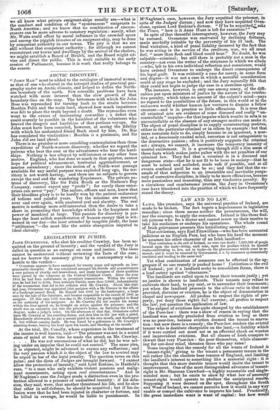ARCTIC DISCOVERY.
a JOHN RAE" Mat be added to the catalogue of immortal names, as that of one who shared in the intrepid studies of practical geo- graphy under an Arctic climate, and helped to define the North- ern boundary of the earth. Few scientific problems have been watched with more interest than the slow growth of that boundary-line on the map. The bitterness with which Sir John Ross was reproached for turning back in the straits between Boothia Felix and the main land, showed how much impatience was felt to place the truth beyond a doubt. The reproaches even went to the extent of insinuating cowardice ; a defect that could scarcely be possible in the humblest of the volunteers who braved the dangers and hardships of that perilous voyage. Sir John must have been consoled, however, at seeing the fidelity with which his undaunted friend Back stood by him. Dr. Rae has completed the vindication : Boothia is a peninsula, and Sir John did see land ahead.
There is no grander or more ennobling contemplation than these expeditions of North-western discovery, whether we regard the patrons who bear the cost or the adventurers who bear the hard- ships. Nothing is less alloyed by self-interest or any other base motive. England, who has done so much in that quarter, cannot hope fof political advancement, territorial aggrandizement, or marine ascendancy ; since the notion of a North-west passage available for any useful purpose was exploded long ago, the ter- ritory is not worth having, and there are no subjects to govern except the seal and the wandering Esquimaux. The private pa. trona of discovery, like Sir Felix Booth or the Hudson's Bay Company, cannot expect any "profit" ; for surely these enter- prises can never "pay." The sailors, officers and men, know that their bloodless glory is to be hardly won by the patient endurance of tedious and painful years. Yet the missions are renewed, over and over again, with unabated zeal and alacrity. The real motive is nothing more self-interested than the desire to take a share in promoting that knowledge which is the happiness and power of mankind at large. This passion for discovery is per- haps the least selfish manifestation of human energy that is wit- nessed in our day—the least attended by tangible profit, the least "utilitarian "—the most like the active abnegation imputed to ideal chivalry.


























 Previous page
Previous page